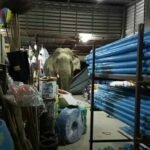Waitrose, Boots and Walgreens are among the retailers pulling Thai coconut milk from their shelves after a PETA investigation alleged rampant abuse
Even Boris Johnson’s fiancée weighed in on the ‘enslavement’ of coconut-picking macaques. But locals say its an age-old practice and deny the claims
For Somjai Saekhow, training monkeys to pick coconuts is a way of life, and something that trainers like her have been doing in southern Thailand
for centuries.
The 48-year-old, who runs the First Monkey School in Surat Thani, 650km south of Bangkok, said the country’s coconut farmers share a close bond with their pigtail macaques and are “proud of their monkeys, especially when they can do so well”.
But this age-old practice is now under threat after being condemned by animal rights activists – jeopardizing the country’s 12.3 billion baht (US$394.8 million) coconut industry.
Thailand is the world’s top exporter of coconut milk, much of which goes to the three biggest importers – Australia, Britain, and the United States. But following the recent uproar over the use of monkeys for harvesting, Thai coconut milk is disappearing from British supermarket shelves, as well as some in the US and the Netherlands.
The move follows an undercover investigation by the People for the Ethical Treatment of Animals (PETA) activist group, which said it had visited eight farms where monkeys “are forced to pick coconuts” for use in popular Thai coconut milk brands such as Aroy-D and Chaokoh.
In a report published earlier this month, the organisation said that when the macaques were not working, they were kept tethered, chained to old tyres or “confined to cages barely larger than their bodies” – with one investigator reporting that “if the monkeys try to defend themselves, their canine teeth may be pulled out”.
“Virtually all coconuts from Thailand are picked by abused monkeys,” said PETA President Ingrid Newkirk in a statement on July 3, adding that the animals “are denied mental stimulation, companionship, freedom, and everything else that would make their lives worth living”. PETA went on to call on the Thai government to ban the “enslavement of monkeys”.
In response to the investigation and accompanying video, Carrie Symonds – fiancée of British Prime Minister Boris Johnson – took to Twitter to say she was “glad” major British retailers such as Waitrose, Co-op, Boots, Ocado and Morrisons had either “vowed not to sell products that use monkey labour” or already removed them from their stores. “Time for all supermarkets to do the same,” she added.
Thank you @PETAUK and @horton_official for making us all aware about this. So glad that supermarkets have acted so speedily https://t.co/FLL6XmCZQR
— Carrie Symonds (@carriesymonds) July 3, 2020
Other retailers to announce the removal of Aroy-D and Chaokoh products from their shelves include Walgreens and Duane Reade in the US and Albert Heijn in the Netherlands, according to PETA.
Yet in a July 7 statement posted to its Facebook page, Thai Agri Food – owner of the Aroy-D coconut milk brand – denied that any of its products were made using animal labour, saying its coconuts were harvested by fruit picking poles. Theppadungporn Coconut Company, the maker of Chaokoh coconut milk, also said that it buys coconuts from plantations that use humans to harvest, adding that retailers abroad have been contacting the company on this issue.
Somjai, the trainer from Surat Thani, took issue with PETA’s claim that coconut-picking monkeys were “abducted from their homes in nature” – pointing out that all the macaques she trains were bred by farmers, as poaching protected species from the wild is a crime in Thailand.
Nirun Wongwanit, who owns a nearby coconut farm, said that he treated the 38 macaques in his care like his own children. He disputed PETA’s findings, particularly the claim that monkeys were driven “insane” by being forced to pick as many as 1,000 coconuts a day.
“At my farm, a worker works with two monkeys at a time from 8.30am until 11am and 2.30pm to 5pm,” the 52-year-old said. “Each monkey can pick about 400-500 coconuts a day, but they don’t work every day – certainly, we don’t remove their fangs, because they need them to remove the coconuts from the trees.”
He did note PETA’s concerns, however, and said he would “hire more workers, even though monkeys are so much faster as they jump from one tree to the next”.
Other trainers, such as Luesak Pattanawat, were less concerned about the PETA report. Comparing coconut-picking monkeys to the use of cattle in farming, the 56-year-old estimated that there were thousands of monkeys deployed across the industry in Thailand’s south and said he had heard few stories of abuse.
That being said, he did admit to training one of the four monkeys he owns to ride a bicycle – “because tourists seem to like it”.
Officials from Thailand’s commerce ministry, animal welfare agency, and representatives from the industry met in Bangkok on Wednesday, and have agreed to create measures that ensure the traceability of Thai coconut products, according to a statement.
Packages will be marked with a code that can be used to track the products back to their source, which will show whether they came from monkey-free plantations.
Not all use monkeys anyway. Coconuts that are harvested for their water are often grown from dwarf trees – as opposed to the 15 metre tall trees whose coconuts are harvested for their milk – allowing them to be collected by humans using tools like a long bamboo stick or a pole pruner.
This is the reason Narongsak Chuensuchon, whose main export market is China, gave for not deploying any monkeys at his young coconut farm in Ratchaburi province, some two hours southwest from Bangkok, adding that he had “not yet seen a drop in orders from anywhere”.
 Thai Commerce Minister Jurin Laksanawisit said earlier this week that monkeys picking coconuts “on an industrial scale” no longer occurred in Thailand. Foreign dignitaries would be invited to inspect the country’s coconut plantations to see how monkeys were treated, he said.
Thai Commerce Minister Jurin Laksanawisit said earlier this week that monkeys picking coconuts “on an industrial scale” no longer occurred in Thailand. Foreign dignitaries would be invited to inspect the country’s coconut plantations to see how monkeys were treated, he said.
His adviser, Alongkorn Ponlaboot, said that all the country’s animals were protected under the 2014 Prevention and Welfare of Animal Act and that Thailand was not the only nation deploying animals for economic or entertainment purposes.
This is not the first time that Thai exporters have been accused of ethical breaches or failing to meet international standards. In 2015, the European Union threatened to ban seafood from the country
amid allegations that it was allowing illegal fishing and slave labour on board its fishing trawlers.
However, in January last year the EU lifted its so-called yellow card on Thai seafood exports, citing a “major upgrade of the Thai fisheries governance” and Thailand’s “constructive process of cooperation and dialogue”.




